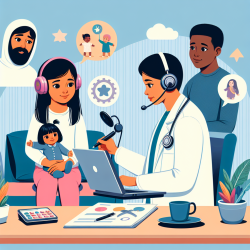The field of reproductive technology is on the brink of a revolutionary change with the advent of in vitro gametogenesis (IVG). This groundbreaking research offers promising possibilities for individuals and families who face challenges with traditional assisted reproductive technologies. As a practitioner, understanding these advancements can enhance your skills and improve the services you provide to your clients.
The Promise of In Vitro Gametogenesis
IVG is an emerging technology that enables the creation of gametes (eggs and sperm) outside the human body using pluripotent stem cells. This advancement holds significant potential for those experiencing infertility or for LGBTQ+ individuals seeking to form families. According to a recent study published in Stem Cell Reports, stakeholders express hope that IVG could lead to higher reproductive success rates, alleviate the physical and emotional burdens associated with current assisted reproductive technologies (ART), and promote greater social inclusion.
Key Findings from the Research
- Noninvasive Gamete Provision: Participants in the study were optimistic about IVG's ability to provide gametes without invasive procedures like egg retrieval.
- LGBTQ+ Inclusion: The technology is seen as a step towards greater equity by enabling same-sex couples to have biologically related children.
- Concerns Over Safety and Accessibility: While hopeful, stakeholders voiced concerns about the safety of IVG and its financial accessibility.
The Role of Practitioners in Embracing IVG
The introduction of IVG into clinical practice will require practitioners to adapt and expand their expertise. Here are some ways you can prepare:
- Stay Informed: Regularly attend conferences, webinars, and read publications about advancements in IVG and related technologies.
- Cultural Competence: Develop an understanding of the unique needs and concerns of diverse communities, including LGBTQ+ individuals and those experiencing infertility.
- Advocacy for Accessibility: Advocate for policies that ensure equitable access to new reproductive technologies for all individuals, regardless of socio-economic status.
- Sensitivity Training: Engage in training that enhances your ability to support clients through the emotional complexities associated with fertility treatments.
The Ethical Landscape
The ethical implications of IVG are significant and require careful consideration. Practitioners must navigate concerns such as genetic manipulation, consent issues regarding cell use, and potential societal impacts. Engaging with bioethicists and participating in discussions about these topics will be crucial as IVG moves closer to clinical application.
A Call to Action for Further Research
This research underscores the importance of continued engagement with stakeholders who have lived experiences relevant to IVG. As a practitioner, you can contribute by encouraging further research into the social and ethical dimensions of this technology. Collaborate with researchers, participate in studies, and contribute your insights to shape a future where reproductive technologies are safe, accessible, and equitable for all.
The potential of IVG to transform reproductive medicine is immense. By staying informed and actively participating in its development, practitioners can ensure they are well-equipped to support their clients through these exciting changes.
Anticipating in vitro gametogenesis: Hopes and concerns for IVG among diverse stakeholders










